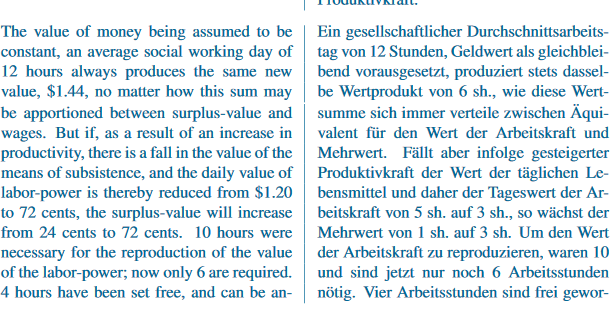I live in country with a communist ideology, and Marxism-Leninism courses are mandatory in college. As much as I appreciate some basics on dialectical materialism, I can't help but disdain the way Marxism are taught, that basically tells you to just accept stuff without questions and at the same time acts very smug about their "superior" ideology. It's especially hard to buy into Marxism because lots of terms and examples they cite to prove a point that are supposedly originated by Marx himself are incredibly difficult to verify.
Did Karl Marx ever use any example that involved cotton and dollars to illustrate the way capital and surplus value were generated? According to this "Doctor" guy in whatever he has a doctorate in, Marx proved capitalists' exploitation in capital generation illustrated how surplus value is generated and appropriated by the capitalists, not the workers, for free, with this example:
To create fabric, the capitalist needs $20's worth of cotton, $4 for machine deterioriation in the production process, $6's worth of labor effort. The true value of a man day (12 hours)'s worth of labor effort is $6, but the capitalist pays his workers only 3 and keeps the other 3 for himself as surplus value. Therefore the cost of production ends up only as $27 instead of $30, and the capitalist profits $3 dollars off his workers.
That's the rough translation, but it kinda sounds suspicious that Marx just used "dollars" in his example for some reason. I mean Germany had its own currency back then right? Did he have beef with Americans or something, or were there no capitalists in Germany for him to "reveal their true exploitative nature"? I asked that lecturer and he just said "I learned this a long time ago but never really bothered to question if 'dollars' really made sense in the context of 19th-century Germany."
Edit: To those who think I'm citing a translation of a translation of a direct quote from Das Kapital, it's not. It's just a translation the example written by the author of my textbook, so the exact wording definitely doesn't match the original. However, keywords like "dollars", "cotton" and "surplus value" should be immediately searchable together in at least a paragraph if such an example is that famous (even if I use translations, it shouldn't be too hard to search for the German word for "cotton"), and in this case they're not, which lessens the credibility of the claim that this was an example Marx actually made.
